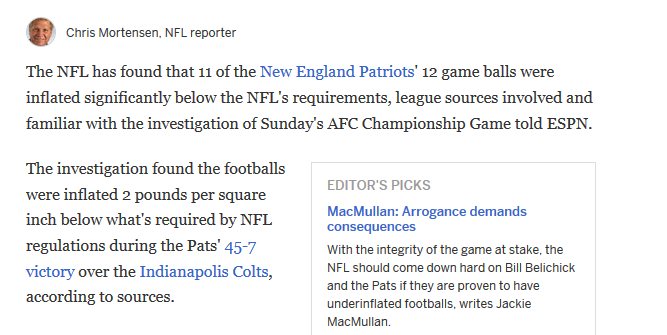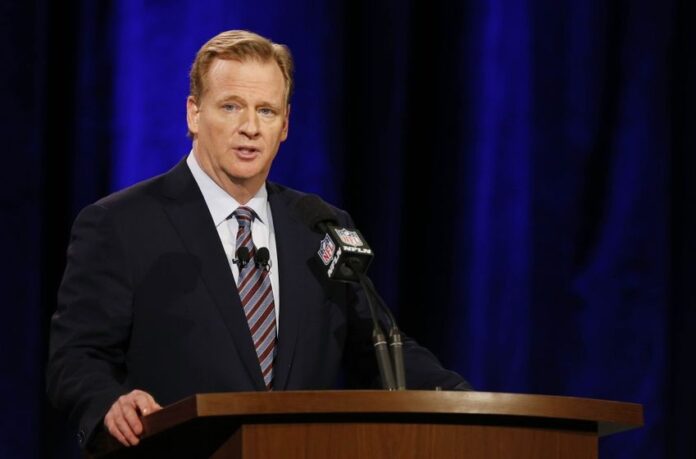New Info Puts NFL Commish Under Heatlamp He Unwittingly Turned On
It’s been nearly a fortnight since Ted Wells released his account… uh… “report” to the league, media, and fans.
In this span, the scant few in the media not towing Roger Goodell’s line have delved beyond Wells’ outlined points to uncover the obscured reality on his other hand.
What began as an inquiry focused on Patriots‘ ball attendants may eventually unveil the surprising number of water attendants [both male and female] toiling without pay for the NFL.
This entire spectacle revolves around an allegation targeting one party’s credibility (Tom Brady) made by another party (the NFL) whose own compromised credibility has rightfully been scrutinized by the public for much of the year.
Embracing the assumptions and leaps of logic in the Wells report requires a suspension of disbelief, envisioning the accuser as impartial, diligent, and faultless – essentially as pure as freshly fallen snow.
Turning a blind eye to this fact to target the hated Patriots is one of the most glaring displays of tunnel-visioned journalism in recent memory.
Following the AFC Championship game, the NFL stated that “the investigation commenced promptly on Sunday night [January 18th].”
After the announcement of the investigation, on January 29th, Roger Goodell held his annual Super Bowl press conference, delivering his customary evasive responses to direct questions.
At the time, it seemed like a futile exercise, but looking back, it becomes evident that it was crucial in establishing Goodell’s official stance – a stance that can now be compared to the reality of what transpired behind closed doors.
Uh-oh. Time for an integrity check…
*Highlighted sections indicate questions from the press conference. Goodell’s responses are presented in red, followed by my comments.
**You can access the complete transcript of the Goodell Super Bowl press conference here.
With such a focus on off-field issues, including what the public perceives as failures in the league’s investigative process dating back to the Saints’ bounties, as well as some problems on the field that you just referred to, what do you plan to do specifically to restore faith in the league and the shield?
RG: …we are also, as we have demonstrated with Ted Wells, not afraid to go outside and to get an outside perspective that can be valuable to us – a professional perspective that will give us the kind of outcome that we want – which is fair with the truth being clear.”
One of the critical concerns raised by the Patriots in this investigation revolves around the suspicion of a preconceived conclusion, suggesting that the inquiry aimed to justify the questionable actions of the Colts and NFL officials.
A noticeable trend emerges as you peruse Wells’ report, where he consistently overlooks or downplays evidence that contradicts or disproves the league’s hypothesis of ball tampering by the Patriots.
What’s intriguing about Goodell’s wording here is an unintentional moment of frankness when he acknowledges the benefit of having Wells compile the report: it provides [the NFL] with the desired outcome. Adding the qualifier “which is fair with the truth being clear” is a rather implausible embellishment, given that when Goodell approached the microphone, false information about the Patriots’ ball pressure readings was allowed to circulate from league sources (outlined below). The truth was distorted and subsequently hidden. Fair? Clear truth? Yeah, right…

Opting not to disclose the truth to the public serves as compelling circumstantial evidence that the league was indeed achieving precisely the “desired outcome.”
This piece of circumstantial evidence carries far more weight than any relied upon by Wells in his conclusions regarding tampering.
Many people in America, if they went through the year that you’ve had, probably would have resigned or been fired. Can you envision any circumstances that would lead you to resign or be fired from your job as commissioner?
RG: No, I can’t. Does that surprise you? Listen, it has been a tough year. It’s been a tough year for me personally. It’s been a year of what I would say is humility and learning.
The question begins by alluding to the insane idea that Roger Goodell faced no consequences for mishandling the Ray Rice situation, followed by a hypothetical scenario pondering if there’s any conceivable circumstance in which he could be terminated. Goodell promptly responds with a straightforward “no,” followed by a mention of “humility.”
There’s a certain irony in claiming humility while asserting to the world that you’re immune to dismissal, no matter how poorly you perform in your role.
Later in that same response…
RG: We’ve done a great deal to bring more awareness to these issues of domestic violence and sexual assault.
There’s a certain irony in claiming “integrity” while boasting about how your severe mishandling of a domestic violence case has raised awareness for the issue. It’s pretty astonishing.
The fact that NFL media members didn’t vigorously criticize this statement at the time speaks volumes, and it’s equally disheartening.
You guys have faced many problems over the past year that have an extensive range, but what a lot of the issues have in common is a conflict of interest.
RG: I don’t agree with you on many of the assumptions you make in your question. I think we have had people that have uncompromising integrity. Robert Mueller is an example of who – I think you asked me the same question last fall about a conflict of interest – their integrity is impeccable. Ted Wells’ integrity is impeccable.
Later in that same answer…
RG: Somebody has to pay them, Rachel [Nichols, CNN]. Unless you’re volunteering, which I don’t think you are, we will do that.
Absolutely spot-on, Rog, condescension at its finest. What’s particularly revealing about this response—aside from Goodell’s apparent lack of comprehension regarding “conflict of interest”—is his outright refusal to address a direct question that strikes at the heart of the credibility of this entire affair.
It strains credulity (to borrow a phrase from Wells) to think that Roger doesn’t grasp that appointing someone to investigate yourself is a textbook example of a conflict of interest.
This is especially evident when the prospect of future contractual engagements hinges on not tarnishing your employer, which the facts of a thorough investigation would inevitably do.
Wells wouldn’t be rehired any faster than Goodell solicits Barbara Jones to oversee Tom Brady’s ongoing appeal.
Instead, Wells absolves every NFL-affiliated party involved in this inquiry of any wrongdoing and embraces every assumption they lay before him, no matter how far-fetched.
These are not the actions of a genuinely independent investigator. Rachel Nichols hit the nail on the head—conflicts of interest don’t seem to bother the NFL in the slightest; they revel in them.
And with a largely compliant NFL press corps trailing along, why would the league ever feel compelled to change?
At the time of this dodge by Goodell, we were unaware that Wells would also enlist Exponent, a hired-gun consulting firm with a questionable reputation for manipulating results to present the most favorable outcome for their client.
Nichols might not have been aware of it then, but the layers of conflict of interest within the NFL ran even more profound than anticipated.
Has the NFL ever tested the air pressure of footballs in the middle of the game, and how important is that as a frame of reference in the Patriots’ investigation?
RG: Just so I am clear when you say middle of the game, do you mean while play is going on?”
At halftime.
RG: Well, I think we were pretty clear. We tested them at the AFC Championship Game at halftime.”
Have they ever been tested at other games as a frame of reference related to that?
RG: I don’t know the answer to that question. That would be something, I presume, that Ted Wells would look into and will provide that information.”
The crucial aspect of this exchange is Roger’s admission that he “presumes” Wells will investigate specific relevant matters even though he hasn’t expressly directed him to do so.
Subsequent email correspondence between Jeffrey Pash (the league’s counsel) and Daniel Goldberg (the Patriots’ counsel) reveals that the internal protocol lapses by league officials, the illegal in-game measurement of the balls by the Colts (non-referee personnel), and the dissemination of misleading information by the league offices were all flagged as concerns.
However, these significant issues were conspicuously absent from Wells’ determinations (as linked here).
https://wellsreportcontext.files.wordpress.com/2015/05/pash_correspondence1.pdf
The most reasonable inference here is that Wells strictly adhered to his instructions, which, as Goodell explained earlier in the press conference, were geared towards two very specific queries: “Why were some footballs used in the game that were not in compliance with the rules, and was this the result of deliberate action?”
Wells remained firmly on the path laid out for him in his report, even when the evidence shed light on other league-related issues.
The concern raised by the questioner here, the concerns raised by the Patriots’ counsel, and the evident flaw in the impractical rule that assumes thousands of “non-compliant” balls have been in play over the years in cold weather due to the Ideal Gas Law and outdoor games—all of these matters couldn’t have been investigated by Wells unless explicitly directed by Goodell.
If the league offices didn’t instruct it, it simply wasn’t pursued.
[on punishing rules violations]
RG: If there are rules that dictate the pressure in footballs, or there are rules about how the game is played between the white lines, we’re going to enforce those rules. They’ll be enforced whether they are implemented with penalties, financial penalties, suspensions, or draft choices. Any number of things can be used in that context if there is a violation of the rules. Whether a competitive advantage was actually gained or not is secondary in my mind to whether that rule was violated. That’s the integrity of our game, and when those rules are violated, we will take that seriously.
Here’s the rather tight spot Goodell has wedged himself into, underscoring how an adept leader would have prevented this entire process from spiraling down its current path.
According to Roger’s rationale, any ball that enters play violating the rule must be penalized because, as he puts it, “whether a competitive advantage was actually gained or not is secondary in my mind to whether that rule was violated.”
Rule 2 (outlined below) contains no provisions regarding whether the violation was intentional, only that it occurred. Even the fundamental laws of science must yield to Uncle Roger’s regulations.
http://static.nfl.com/static/content/public/image/rulebook/pdfs/5_2013_Ball.pdf
This implies that the 16 psi balls and the officiating crew in the October Jets game (as revealed in the text messages between Patriots employees), practically every cold-weather match since the rule’s inception where the Ideal Gas Law could have caused balls to dip below legal levels, Aaron Rodgers’ comments on over-inflation, and the Minnesota Vikings’ heated balls—all must be pursued with the same diligence.
No more turning a blind eye or issuing toothless warnings. No claiming ignorance. Every instance. Or else Roger stands as a glaring hypocrite.
This could potentially serve as a plausible exit strategy for Goodell. He’s faced with an almost impossible task of ruling on this with genuine integrity.
The rule is a poorly drafted joke that ignores basic physics. Attempting to enforce it with penalties is the antithesis of integrity.
For him to publicly acknowledge the glaring flaw in his rule would be a monumental departure, but it does provide him an escape route because the scale of punishments if he were to adhere to his public statements, would be calamitous for the league and entirely unfeasible.
[on the importance of the truth]
RG: We want the truth. That’s what I think our fans want; that’s what our clubs want. So, we want to make sure that we find that truth. If there are rules violations, we take them seriously, mainly when they deal with the integrity of the game and the authorities.
Truth? Really? So you acknowledge that your fans seek the truth, yet you let the false leaks persist without correction? They yearn for the truth, yet you either mislead them or allow them to remain misinformed?
Deceptive. It’s difficult to deny that a misinformed public didn’t serve Goodell’s interests in fanning the flames of this spectacle, so there’s that.
Furthermore, we know the assertion that “we take them seriously” is untrue. There’s no need to dwell on this point.
The Vikings tampered with balls in plain view and faced no repercussions—meaning none of the penalties Goodell outlined earlier in this press conference. Integrity.
In the grand finale of this saga, we’re expected to buy into the notion that the most paramount entity in the football universe is the NFL’s rulebook—a set of regulations they struggle to comprehend, adhere to, or consistently enforce themselves. All in the name of integrity, or so they say.
Since the unveiling of the report from this, shall we say, “investigation,” the NFL has meticulously scrutinized the actions of two modestly paid employees—and still unearthed no substantial evidence of tampering with footballs or their inflation levels.
Perhaps a more productive use of that time and effort would have been to hold the integrity-challenged NFL accountable to its own standards.
What absurd twist awaits in the next chapter of this tale? It’s a safe bet it won’t involve a genuine commitment to integrity…

